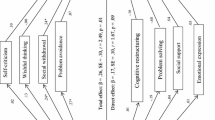Abstract
Explanations involving the etiology of pathological gambling have tended to emphasize psychosocial factors. However, the possibility that psychobiological factors are important should not be ruled out. Two currently researched psychobiological approaches to gambling involve the role of (i) arousal and (ii) depression. A study analyzing the subjective mood variables of 60 gamblers (44 males and 16 females; mean age 23.4 years) using self report measures was carried out in an attempt to identify which mood states are critical to gambling maintenance. Results indicated that regular and pathological gamblers experienced more depressive moods before playing and that regular and pathological gamblers experienced significantly more excitement during gambling than non regular gamblers. These results are discussed in relation to contemporary literature regarding the roles of arousal and depression in the maintenance of gambling behaviour.
Similar content being viewed by others
References
American Psychiatric Association (1987).Diagnostic and Statistical Manual of Mental Disorders (3rd Edition-Revised). Washington, D.C.: Author.
Anderson, G. & Brown, R.I.F. (1984). Real and laboratory gambling, sensation seeking and arousal.British Journal of Psychology, 75, 401–410.
Blasczcynski, A.P. & McConaghy, N. (1988). SCL-90 assessed psychopathology in pathological gamblers.Psychological Reports, 62, 547–552.
Blasczcynski, A.P. & McConaghy, N. (1989). Anxiety and/or depression in the pathogenesis of addictive gambling.International Journal of the Addictions, 24, 337–350.
Blasczcynski, A.P., McConaghy, N. & Frankova, A. (1990). Boredom proneness in pathological gambling.Psychological Reports, 67, 35–42.
Boyd, W. (1982). Excitement: The gambler's drug. In W.R. Eadington (Ed.),The Gambling Papers, (pp. 371–375). Springfield, Illinois: Charles C. Thomas Co.
Brown, R.I.F. (1987). Classical and operant paradigms in the management of compulsive gamblers.Behavioural Psychotherapy, 15, 111–122.
Brown, R.I.F. (1988). Arousal during play in normal machine gamblers. Unpublished manuscript, Department of Psychology, University of Glasgow.
Brown, R.I.F. (1989). Relapses from a gambling perspective. In M. Gossop (Ed.),Relapses and Addictive Behaviour, (pp. 107–132). London: Routledge.
Dickerson, M. (1989). Gambling: A dependence without a drug.International Review of Psychiatry, 1, 157–172.
Dickerson, M. and Adcock, S. (1987). Mood, arousal and cognitions in persistent gambling: Preliminary investigation of theoretical model.Journal of Gambling Behavior, 3, 3–15.
Dickerson, M., Hinchy, J. and Fabre, J. (1987). Chasing, arousal and sensation seeking in offcourse gamblers.British Journal of Addiction, 82, 673–680.
Greenson, R.R. (1947). On-gambling.American Imago, 4, 61–77.
Griffiths, M.D. (1990a). The cognitive psychology of gambling.Journal of Gambling Studies, 6, 31–42.
Griffiths, M.D. (1990b). The acquisition, development and maintenance of fruit machine gambling in adolescents.Journal of Gambling Studies, 6, 193–204.
Griffiths, M.D. (1990c). Addiction to fruit machines: A preliminary study among males.Journal of Gambling Studies, 6, 113–126.
Griffiths, M.D. (1991). The psychobiology of the near miss in fruit machine gambling.Journal of Psychology, 125, 347–357.
Griffiths, M.D. (1993a). Tolerance in gambling: An objective measure using the psychophysiological analysis of fruit machine gamblers.Addictive Behaviors, 18, 365–372.
Griffiths, M.D. (1993b). Factors in problem adolescent fruit machine gambling: Results of a small postal survey.Journal of Gambling Studies, 9, 31–45.
Griffiths, M.D. (1994). The role of cognitive bias and skill in fruit machine gambling.British Journal of Psychology, 85, 351–369.
Hollander, E., Frenkel, M., Decaria, C., Trungold, S. & Stein, D.J. (1992). Treatment of pathological gambling with clomipramine.American Journal of Psychiatry, 149, 710–711.
Israeli, N. (1935). Outlook of a depressed patient interested in planned gambling.American Journal of Orthopsychiatry, 5, 1–23.
Leary, K. and Dickerson, M.G. (1985). Levels of arousal in high and low frequency gamblers.Behaviour Research and Therapy, 23, 635–640.
Linden, R.D., Pope, M.G. & Jonas, J.M. (1986). Pathological gambling and major affective disorder: Preliminary findings.Journal of Clinical Psychiatry, 47, 201–203.
McCormick, R.A., Russo, A.M., Ramirez, L.F. & Taber, J.I. (1984). Affective disorder among pathological gamblers seeking treatment.American Journal of Psychiatry, 141, 215–218.
Moran, E. (1970). Pathological gambling.British Journal of Psychiatry, 4, 59–70.
Moskowitz, J. (1980). Lithium and Lady Luck.New York State Journal of Medicine, 80, 785–788.
Rule, B.G. & Fischer, D.G. (1970). Impulsivity, subjective probability, cardiac response and risk taking: Correlates and factors.Personality, 1, 251–260.
Rule, G.B., Nutler, R.W. & Fischer, D.G. (1971). The effect of arousal on risk taking.Personality, 2, 239–247.
Stein, D.J., Hollander, E. & Leibowitz, M.R. (1993). Neurobiology of impulsivity and the impulse control disorders.Journal of Neuropsychiatry and Clinical Neurosciences, 5, 9–17.
Wray, I. and Dickerson, M.G. (1981). Cessation of high frequency gambling and “withdrawal” symptoms.British Journal of Addiction, 76, 401–405.
Author information
Authors and Affiliations
Additional information
The author would like to thank the UK Economic and Social Research Council for funding this research through a research studentship. The author would also like to thank Henry Lesieur and the anonymous reviewers for their constructive advice and criticism in the revisions of this paper.
Rights and permissions
About this article
Cite this article
Griffiths, M. The role of subjective mood states in the maintenance of fruit machine gambling behaviour. J Gambling Stud 11, 123–135 (1995). https://doi.org/10.1007/BF02107111
Issue Date:
DOI: https://doi.org/10.1007/BF02107111




